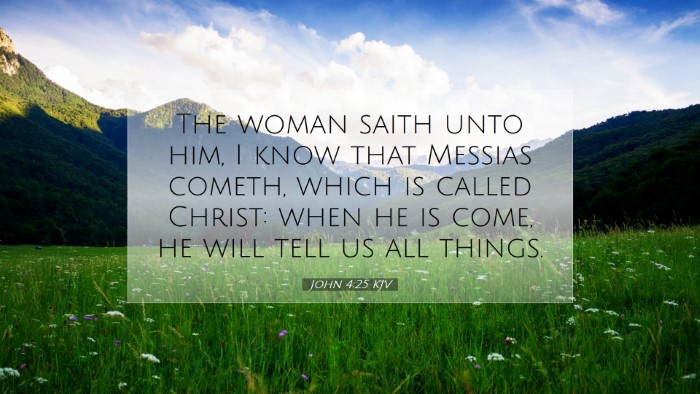Commentary on John 4:25
John 4:25 states: "The woman said to Him, 'I know that Messiah is coming (who is called Christ). When He comes, He will tell us all things.'" This verse is situated within the profound encounter between Jesus and the Samaritan woman at the well, revealing deep theological insights about Messianic expectations, revelation, and the nature of faith.
Contextual Analysis
The narrative in John 4 centers on a pivotal conversation between Jesus and a Samaritan woman, breaking social norms and conveying significant theological truths. The woman’s statement reflects the common expectation among the Samaritans regarding the coming Messiah—referred to as the "Christ."
Historical and Cultural Background
In the historical context, the Samaritans held a divergent view of the Messiah compared to the Jews. They awaited a prophet-like figure to bring clarity and restoration. This expectation illustrates the woman's openness to Jesus' teaching while simultaneously embodying the broader cultural knowledge of Messianic hope. Matthew Henry notes the significance of her anticipating a Messiah, demonstrating her awareness of spiritual need and longing for divine revelation.
Theological Insights
This verse bears witness to a couple of significant theological themes:
- Messianic Expectation: The woman’s assertion about the coming Messiah speaks to the universal hope of redemption and future revelation. Albert Barnes emphasizes that her words highlight an expectation rooted in the prophetic tradition, suggesting that even in Samaria, there was an understanding of a coming savior.
- Revelation of Truth: The proclamation that the Messiah will tell "all things" indicates an anticipated fullness of truth. Adam Clarke elaborates on this thought, suggesting that the woman understood the Messiah as the ultimate teacher who would provide answers to life's mysteries and moral questions.
- Openness to Truth: The woman's engagement with Jesus shows her spiritual openness. Her question embodies a quest for knowledge and truth that resonates with many seeking answers to spiritual dilemmas.
Interpretive Commentary
Matthew Henry asserts that this encounter is not merely about water from the well but signifies the thirst of the soul for divine truth. The woman is not just speaking of a future event but is standing on the cusp of profound interaction with the one who embodies that truth. Christ’s imminent revelation of Himself as the Messiah brings hope and fulfillment to her search.
Albert Barnes further comments that this conversation marks a transition from a general hope in the Messiah to a personal encounter with Him. He states that as Jesus converses with the woman, He authenticates and fulfills her long-held aspirations, pointing to the relational nature of divine revelation.
Application for the Believer
The contemplations surrounding John 4:25 offer pastoral and scholarly insights into the nature of faith and the divine approach towards humanity:
- Yearning for Truth: Just as the Samaritan woman yearned for the Messiah, believers today are reminded of the importance of their own spiritual hunger for truth—one that can only be quenched through a relationship with Christ.
- Jesus as the Fulfillment: This passage illustrates the reality that Jesus is the fulfillment of all Messianic expectation. For pastors, this reinforces the message that preaching must point to Christ, who not only answers our questions but also transforms our lives.
- The Call to Evangelism: The dialogue invites believers to reflect on their role in sharing the hope of Christ with others. Just as Jesus broke cultural barriers to reach the woman, Christians are called to evangelize across all divides.
Conclusion
In John 4:25, we encounter the intersection of expectation, identity, and revelation. The woman at the well expresses a profound desire for understanding that is perfectly fulfilled in her conversation with Christ. This commentary synthesizes insights from public domain theological resources, highlighting the depth of spiritual longing and the ultimate truth revealed in Jesus Christ.
Both pastors and theologians can draw from this rich narrative, recognizing the importance of establishing a personal relationship with Jesus who not only knows but reveals "all things" to those who seek Him earnestly.


